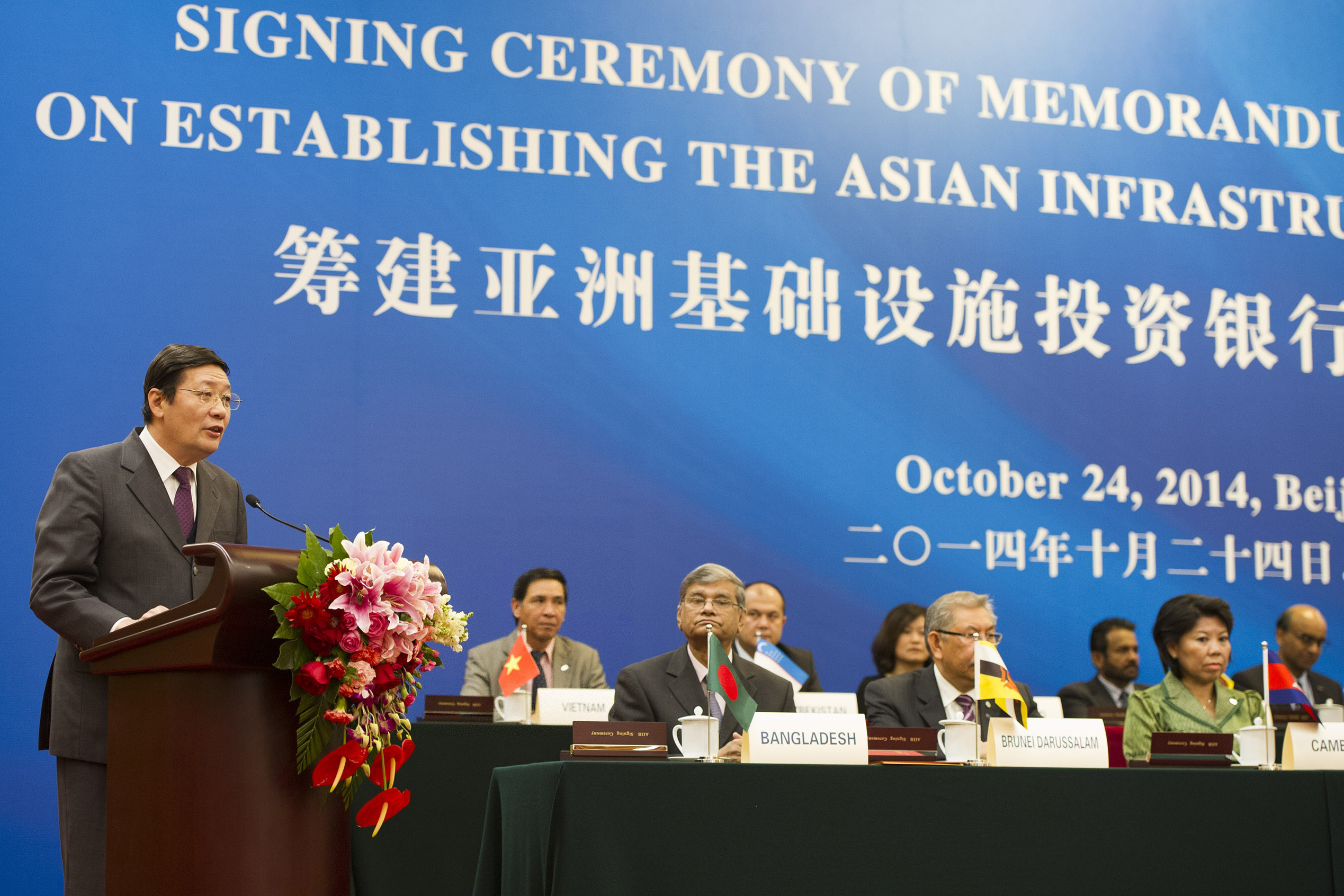
Finance Minister Lou Jiwei delivers a speech at the signing ceremony on establishing the Asian Infrastructure Investment Bank in Beijing in October. The AIIB will be an international financial institution to fund infrastructure projects in Asia.[Photo/Xinhua]
The decision by several European nations to join the Asian Infrastructure Investment Bank will create more opportunities and a win-win formula for the two continents.
Britain, Germany, France, Italy, Luxembourg and Switzerland have agreed to join the China-led international development bank, regardless of pressure from the United States.
The decisions are in these countries’ national interests as they want to catch the development opportunities in the world’s fastest-growing markets rather than remain outside.
With an expected initial subscribed capital of $50 billion, the AIIB will be an international financial institution to fund infrastructure projects in Asia and is expected to be formally established by the end of this year.
The infrastructure markets in China, India and other Asian countries are huge and may offer opportunities for a few decades.
The AIIB aims to use a variety of support measures-loans, equity investment and guarantees-to boost investment in many sectors including transportation, energy, telecommunications, agriculture and urban development.
While the global economy is gradually recovering, European countries are still struggling to boost economic growth, create jobs and move forward smoothly. Europe’s economic stability is being scrutinized by international investors as well as financial and economic analysts.
Joining the AIIB at the founding stage will give these European countries a greater voice and bigger share of fast-growing markets, deepen cooperation with Asian partners, especially China, and lower barriers to their participation in the Asian markets.
Better ties with Asian countries will also reduce the political risks in their investments.
A spokeswoman for the European Commission has endorsed member states’ participation in the AIIB as a way of tackling global investment needs and as an opportunity for European Union companies.
For the AIIB, the participation of European countries as major economic powers will strengthen its fundraising ability and make it more internationalized, representative and inclusive.
These European countries, which have rich financial experience, will work to ensure the new bank follows high standards and practices in terms of governance, safeguards, debt and procurement policies.
The AIIB can draw experience from these countries and other multilateral development banks and avoid their mistakes so as to be a transparent and efficient institution.
China is glad to see more countries join the AIIB as founding members, and the bank’s diversified membership will boost the regional economy and promote professionalism and efficiency in investment.
However, since Britain became the first major Western country to sign up as a prospective founding member of the AIIB, the US has been pressuring its allies, including Australia, South Korea and Japan, not to join the AIIB.
The US sees the AIIB as a rival to the World Bank and Asian Development Bank, where the US wields decisive influence. But actually the AIIB will not challenge these lenders’ roles, as it will focus on infrastructure upgrading in Asian countries, rather than poverty reduction.
In the current multipolar world, most countries will not slip back into Cold War thinking, which is not good for world peace and economic development.
As an open multilateral financial institution, the AIIB’s goal is to improve infrastructure in many nations while working closely with other countries and institutions to promote stable global economic development, which is beneficial to all involved.
China has an open and inclusive attitude in building and operating the Asian Infrastructure Investment Bank, a Foreign Ministry spokesman said on March 23.
“China welcomes interested countries joining the bank,” Hong Lei told a regular news conference.
He made the remarks when asked if China would be willing to cooperate with the United States on the AIIB. The US has been urging its allies not to join the bank.
The China-proposed AIIB, with an expected initial subscribed capital of $50 billion, will be an international financial institution funding infrastructure projects in Asia. It is expected to be set up by the end of this year, according to Jin Liqun, secretary-general of the bank’s interim multilateral secretariat.
Although many countries have applied to join the bank, some traditional allies of the US, such as Japan and South Korea, are hesitating.
However, The Wall Street Journal on March 22 quoted Nathan Sheets, the US treasury undersecretary for international affairs, as saying that the Obama administration is proposing a formal partnership between the bank and Western development institutions like the World Bank.
“The US would welcome new multilateral institutions that strengthen the international financial architecture,” Sheets was quoted as saying.
He added that co-financing projects with institutions such as the World Bank or the Asian Development Bank would help to ensure that the AIIB complements rather than competes with existing institutions.
Hong said the shift in tone by the US shows the new bank’s mission to fund infrastructure projects in Asia has gained wide recognition.
To date, the bank has 27 prospective founding members. Britain, France, Germany, Italy, Luxembourg and Switzerland have recently applied to join as founders.
Jin expects the number of prospective founding members to reach 35 by the end of this month, the deadline for applications.
On March 23, Premier Li Keqiang said during a meeting with Takehiko Nakao, president of the Asian Development Bank, that Beijing’s proposal to set up the AIIB is aimed at helping regional interconnectivity and to provide an economic boost.
The new institution will complement existing development banks with an open attitude to achieve a win-win situation, Li said.
Dominic Barton, managing director of multinational management consulting company McKinsey & Co, who was also attending the China Development Forum, said the idea of having another multilateral organization like the AIIB is good as long as it is multilateral.
Zhao Yinan and Xinhua contributed to this story.
